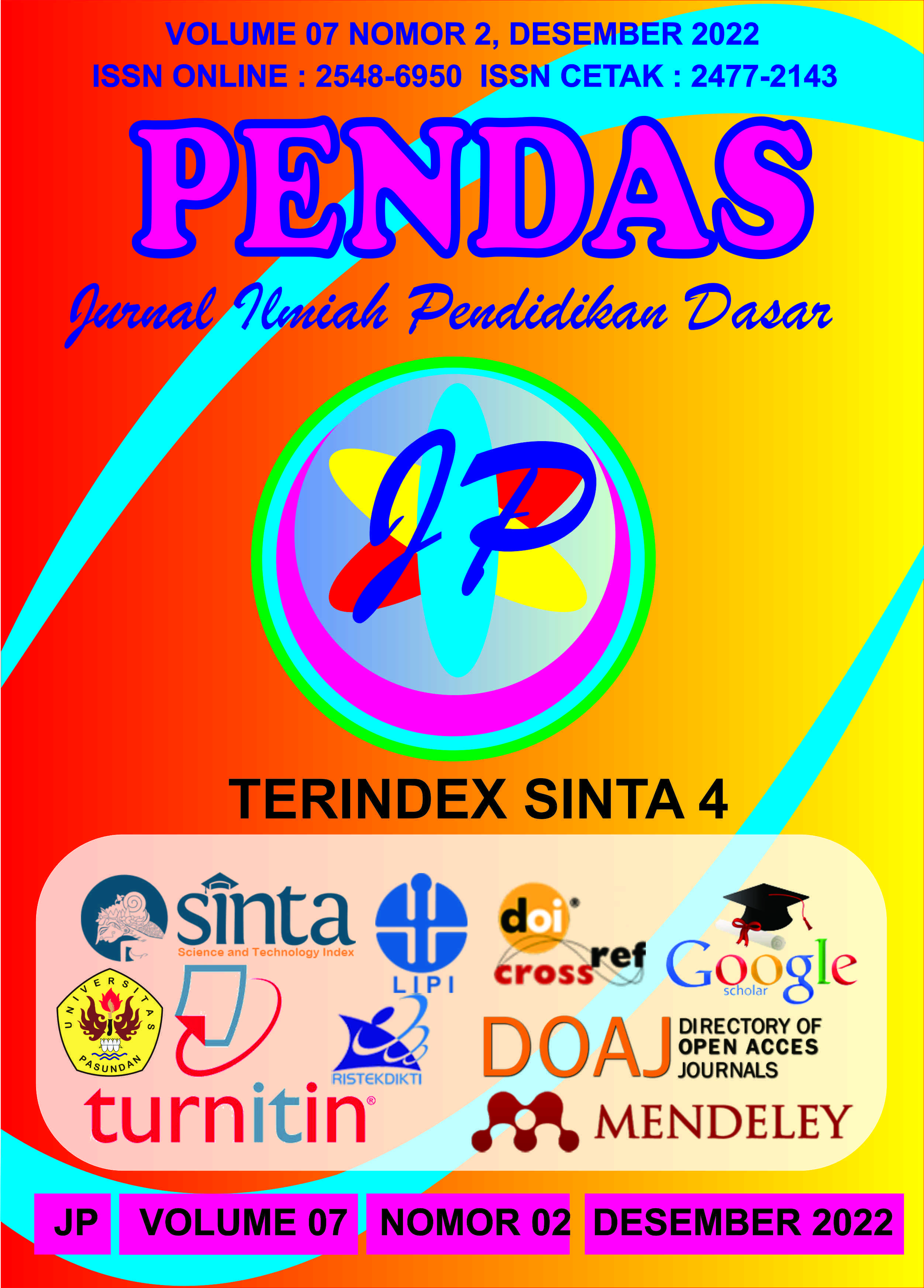PENGARUH MODEL QUANTUM LEARNING TERHADAP KEMAMPUAN PEMAHAMAN MATEMATIS SISWA KELAS IV SDN RAWALELE DAWUAN
DOI:
https://doi.org/10.23969/jp.v7i2.7190Keywords:
Mathematical Understanding, Quantum Learning Learning ModelAbstract
This research is motivated by the low ability of mathematical understanding of grade IV students. The purpose of this research is to find out how far the influence of the quantum learning model has on the ability to understand mathematics. The samples in this study were 19 students from Rawalele Elementary School, class IV A, and 19 students from class IV B. The data in this study were collected through written tests and documentation. The method used is a quasi-experimental research design using The Nonequivalent Pretest Posttest Control Group Design. Based on the processing and analysis of research data, namely: (1) The quantum learning model can improve students' mathematical understanding abilities in the experimental class by using the quantum learning model and the control class with conventional models in class IV SDN Rawalele. Experimental class students (using the quantum learning model) have an average N-Gain of 0.57, whereas with the criteria of "moderate" improvement while the average N-Gain increase in the control class (not using the quantum learning model) is 0.20 with criterion of “low” improvement. (2) The quantum learning model influences the ability to understand mathematics. Based on the results of the hypothesis test (t-test) posttest data of the experimental and control classes, the results of the t-test (ttable) were 2.024 while the tcount was 2.381 so it was stated that tcount ≥ ttable which means H0 is rejected and H1 is accepted. Thus there is an influence on the quantum learning model on students' mathematical understanding abilities (3) The quantum learning model has a major effect on students' mathematical understanding abilities; (3) The results of the effect size test obtained d, namely 1.82, with the criteria of "large". So the quantum learning model has a major influence on students' mathematical understanding abilities with the subject of the concept of multiples and factors of a number.
Downloads
References
Andiani, Y. (2019). “Pengaruh Model Pembelajaran Quantum Learning Dengan Media Piranti Lunak Presentasi Terhadap Hasil Belajar Pada Materi Perkalian Bilangan Bulat di Kelas V SDN 5 Simpangkatis”. Jurnal Inovasi Matematika. 1 (1), 38-51. Tersedia: http://garuda.ristekbrin.go.id/documents/detail/1707294 Diakses Pada 13 Desember 2020
Anwar, C. (2017). Buku Terlengkap Teori-Teori Pendidikan Klasik Hingga Kontemporer. Yogyakarta : IRCiSoD
Ape, T (2015). “Penerapan Model Pembelajaran Quantum Learning Dengan Media Presentasi Terhadap Peningkatan Hasil Belajar Fisika Peserta Didik Kelas VII.5 SMP Negeri 14 Makassar”. Jurnal Pendidikan Fisika. 3 (1), 64-73. Tersedia: https://journal.unismuh.ac.id/index.php/jpf/article/view/253/239 Diakses Pada 13 Desember 2020
BSNP. 2016. Peraturan Menteri Pendidikan Dan Kebudayaan Nomor 21 Tahun 2016. Tersedia: https://bsnp-indonesia.org/wp-content/uploads/2009/06/Permendikbud_Tahun2016_Nomor021_Lampiran.pdf diakses pada : 19 Juli 2020
Cahyaningrum, M, D. (2019). “Pengaruh Model Pembelajaran Quantum Teaching Tipe Tandur Terhadap Hasil Belajar”. Indonesian Journal of science and mathematics education. Vol 2 (3). Tersedia http://ejournal.radenintan.ac.id/index.php/IJSME/article/view/4363 diakses pada 05 desember 2020
De Porter, B dan Hernacki, M. (2009). Quantum Learning Membiasakan Belajar Nyaman dan Menyenangkan. Bandung : Kaifa
De Porter, B. et. al. (2007). Quantum Teaching: Mempraktikan quantum learning diruang-ruang Kelas. Bandung : Kaifa
Fajarwati, E, S. (2019). “Model Quantum Teaching Untuk Meningkatkan Hasil Belajar Peserta Didik Tentang Suhu di SMP”. Jurnal Pendidikan Dan Pembelajaran Khatulistiwa. 8(6),1-10. Tersedia: https://jurnal.untan.ac.id/index.php/jpdpb/article/view/33366/75676581483 Diakses Pada 13 Desember 2020
Firdaus, M, F. (2013). “Pengaruh Quantum Learning Terhadap Penalaran Matematis Siswa Sekolah Dasar”. EduHumaniora. 5(2),89-100. Tersedia: https://ejournal.upi.edu/index.php/eduhumaniora/article/view/2839/1860 Diakses Pada: 14 Agustus 2020
Firdaus, M, F. (2017). Model-Model Pembelajaran di Sekolah Dasar. Bandung : Faza Media
Fuadi, R, dkk. (2016). “Peningkatkan Kemampuan Pemahaman dan Penalaran Matematis melalui Pendekatan Kontekstual”. Jurnal Didaktika Matematika. 3(1),47-54. Tersedia : file:///C:/Users/ACER%20ONE%2014/Downloads/4305-8542-1-SM%20(1).pdf. Diakses pada: 3 Agustus 2022
Hendriana, H, dkk. (2018). Hard Skills dan Soft Skills Matematika Siswa. Bandung : Refika Aditama
Priatna, N dan Yuliardi. R. (2019). Pembelajaran Matematika Untuk Guru SD dan Calon Guru SD. Bandung :PT Remaja Rosdakarya
Purwani, A, D. (2019). Pengaruh Penggunaan Media Komik Strip Terhadap Peningkatan Kemampuan Pemecahan Maalah Matematis. Skripsi. STKIP Subang: Tidak Diterbitkan
Riati, T dan Farida, N. (2017). “Pengaruh Model Pembelajaran Quantum Learning Terhadap Kemampuan Pemecahan Masalah Matematika Siswa Kelas VIII SMP PGRI 02 Ngajum”. Mathematics Education Journal. 1 (1), 15-21. Tersedia : http://garuda.ristekbrin.go.id/documents/detail/805108 Diakses Pada 13 Desember 2020
Silviliyana, M, dkk. (2019) Potret Pendidikan Indonesia Statistik Pendidikan 2019 : Badan Pusat Statistik: Jakarta. Tersedia: https://www.bps.go.id/publication/2019/11/29/1deb588ef5fdbfba3343bb51/potret-pendidikan-statistik-pendidikan-indonesia-2019.html Diakses Pada 21 Desember 2020
Sugiyono. (2015). Metode Penelitian Pendidikan (Kuantitatif, Kualitatif dan R&D). Bandung : Alfabeta
Sugiyono. (2018). Metode Penelitian Kuantitatif, Kualitatif dan R&D. Bandung : Alfabeta
Sukmadinata, N, S. (2017). Metode Penelitian Pendidikan. Bandung
Downloads
Published
Issue
Section
License
Copyright (c) 2023 Pendas : Jurnal Ilmiah Pendidikan Dasar

This work is licensed under a Creative Commons Attribution 4.0 International License.














































